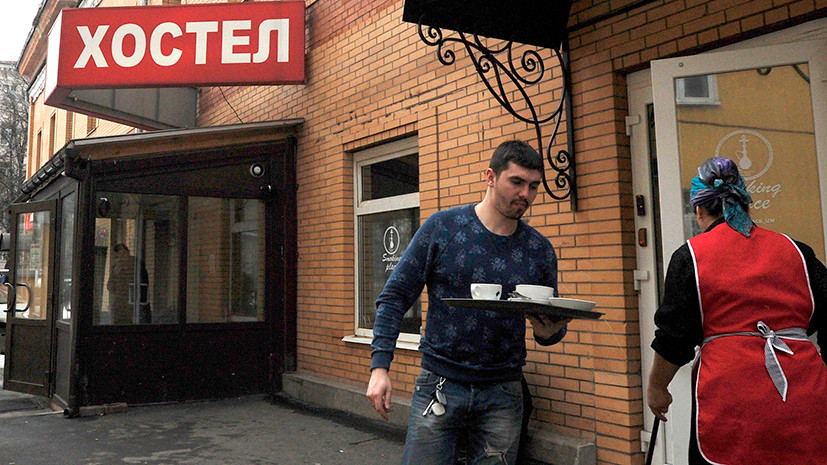The State Duma adopted in its final version a law banning hostels in residential apartment buildings, while the date of its entry into force was postponed to October 1, 2019. Amendments to the Housing Code were re-examined at a plenary session on April 4.
The previous version of the bill, approved by the State Duma on March 13, was rejected by the Federation Council. She suggested that the document would enter into force ten days after signing, but the senators indicated that this was too short a time, since the business needed a transition period to adapt to the new rules. Such an amendment was made to the text of the document.
The very essence of the law has remained unchanged: hotel services will be prohibited to provide in the residential premises of apartment buildings. To accommodate a hostel in such apartments, it will be necessary to transfer them to a non-residential fund and fulfill a number of requirements. For example, this type of hotels can be located only on the first floors of houses with a hotel entrance.
The Federation Council, as it became known on Thursday, intends to approve the new version of the law next week. This was announced by the chairman of the relevant committee of the Federation Council, Oleg Melnichenko, reports RIA Novosti.
“We will consider this law on April 10 and approve it, it was adopted precisely in the wording proposed by the senators with the date of entry into force of the law on October 1 of this year ... The State Duma heard our position,” the senator said.
Chairman of the State Duma Vyacheslav Volodin, in turn, explained that the latest edition of the law will take into account the interests of both residents of apartment buildings and hostel owners.
“We should do everything in this case so that our citizens live in comfortable conditions and do not violate their rights. As for the rights of hostels, we also thought about this, because we are talking only about apartment buildings. Hostels have the opportunity on the first floors to equip the hostel, and with a separate entrance. And then we will have a balance of interests of the citizen and business, ”he stressed.
Reasonable timing
Vice-President of the Russian Union of Travel Industry (PCT), Yuri Barzykin, in an interview with RT, explained that a delay approved by the deputies is absolutely necessary for business. Otherwise, the owners of hostels will lose money for reservations made for the summer, and their clients will be forced to look for other accommodation.
"The Federation Council and the social policy committee did not accept the deadlines that were determined by the State Duma, which completely ignored business interests, did not take into account falling incomes, were antisocial, did not protect those who live in hostels in these houses, so it was proposed to transfer them to October 1, ”said Barzykin.
- © Agency of city news "Moscow"
In his opinion, the changes required by the new law would not have been possible to implement within ten days, as was originally proposed. That is why the Federation Council proposed to the deputies to jointly finalize the document in the conciliation commission.
“A conciliation commission was created, it met twice, it is quite difficult. There were appeals of the regions, including St. Petersburg, about the impossibility of implementation in the set time frame. It was suggested that the deputies should be postponed for the summer, but this brought additional confusion, and the date of October 1 was chosen as a compromise solution, since this is not the tourist season, ”Barzykin concluded.
Recall, according to the Russian Union of Travel Industry, in Moscow in the online systems more than 400 hostels are registered, a little less - in St. Petersburg. According to information from Rosstat, in 2017 in Russia there were a total of about 1.4 thousand hostels.
Benefits for hostels
According to another vice-president of the PCT, Olga Sanaeva, hostels gradually occupy an increasingly significant place in the Russian market, so the new law will affect a sufficient number of private entrepreneurs and their clients.
“As for residential buildings, it’s still one story, when it’s directly in the housing stock, and the other when something is bought by separate entrances. But for many years it served as an accommodation option either for budget groups or for independent tourists, ”Sanaeva said in a conversation with RT.
The delay approved by the legislators will give hostel owners the opportunity to transfer their business from residential to non-residential premises, to issue the necessary documents, the expert is sure.
“But I, again, am talking about those who are adequately engaged in this business, who did it competently and does not inconvenience other tenants. For them, the transition from residential to non-residential is possible in this longer period, ”added Sanaeva.
The speaker of the Federation Council, Valentina Matvienko, initially proposed to postpone the commencement of the law in general to January 1, 2020. According to her, this is necessary in order to "give the opportunity to close the business in a civilized manner." But in the end, the participants in the conciliation commission chose as a compromise date for the commencement of the law on October 1, 2019.

